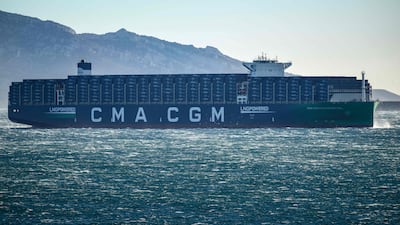Live updates: Follow the latest news on Israel-Gaza
Egyptian officials and importers are growing increasingly concerned over tensions in the Red Sea, following a rise in Houthi attacks on vessels heading to and from the Suez Canal.
The Iran-backed group, which controls the Yemeni capital of Sanaa and is one of Hamas’s allies in the Israel-Gaza war, has stepped up attacks on vessels, particularly those ones owned by or bound for Israel.
It has targeted vessels that enter Bab Al Mandeb, a strait between Yemen on the Arabian Peninsula, Djibouti and Eritrea in the Horn of Africa, on their way to the Suez Canal.
In October, the group threatened to attack Israeli ships in retaliation for its bombardment of Gaza, which has killed about 20,000 Palestinians. This followed attacks by Hamas in Israel that killed about 1,200 people.
In November, the Houthis hijacked a Japanese-operated vessel near the Yemeni port city of Hodeidah.
On Monday, the UK Maritime Trade Operations reported attacks on two vessels near Bab Al Mandeb south of the Yemeni port of Mokha.
On Friday, the Liberian-flagged MSC Palatium III was also attacked by the Houthis, sustaining fire damage before being taken out of service, its operator said in a statement.
The attacks have sent panic through the world’s shipping industry. A sharp rise in inquiries about security have been recorded by Egypt’s Suez Canal Authority, an official at the authority told The National.
A US naval presence in the Red Sea, which has felled multiple Houthi missiles and drones fired at Israel from Yemen, has also added to anxieties among shipping operators that the Suez Canal, the fastest route connecting the Indian Ocean and the Mediterranean, should be avoided during the ongoing war in Gaza continued, the canal official said.
Four of the world’s largest shipping companies – MSC, Hapag-Lloyd, Maersk and CMA CGM – have suspended operations in the Red Sea, choosing instead to reroute their vessels around the Cape of Good Hope, on the southern tip of Africa, until the security risks are handled.
On Monday, BP also announced that it was temporarily pausing voyages through the Red Sea “in light of the deteriorating security situation”, the company said in comments carried by Bloomberg.
Multiple navies and coast guards have issued advisories on the heightened need for security on vessels entering the Houthi-blockaded area, according to research from leading shipping analytics firm S&P Global.
The increased need for security has also resulted in a rise in tanker rates in addition to war insurance rates for shipping worldwide, said David Loosley, secretary general of shipping industry group Bimco, on the sidelines of a shipping summit in Dubai on December 10.
For cash-strapped Egypt, where inflation has hit record highs and foreign debt reached 87.2 per cent of GDP in 2022, the Suez Canal remains one of the most vital sources of foreign currency.
In a bid to quieten security concerns about the Suez Canal, the waterway’s chief Admiral Osama Rabie issued a statement on Sunday asserting that traffic through the waterway was stable and that the authority was monitoring the tensions in the Red Sea closely.
While 55 vessels have chosen to take the longer route around the Cape of Good Hope, according to figures released on Sunday by the authority, 2,128 have safely passed through the Suez Canal, it said.

On Thursday, the authority issued discounts ranging from 25 to 75 per cent for some ships crossing the canal to try to persuade shipping companies not to reroute vessels, the canal official said.
However, some importers have already started to feel a rise in their operating fees due to the increases in tanker and insurance rates, Tawfik Mahmoud, a textiles importer, told The National.
“For me, the rise in my operational fees is coming at the worst possible time. Black market rates for dollars are very high at the moment which has made us reduce the amount of raw material we work with,” he said.
“I had to scale back my business by almost half of my original capacity because of high prices. What I am afraid of is that the situation could get worse with the war and my business will fall apart.”
The US military has stationed forces around the Arabian peninsula since the start of the Israel-Gaza war.
It recently moved its Dwight D Eisenhower Carrier Strike Group from the Arabian Gulf into the Gulf of Aden, off the coast of Yemen.
Though it had initially actively avoided opening a new front of the Israel-Gaza war with the Iran-backed Houthis, the US is now considering more seriously launching retaliatory attacks against the group, senior US officials told Politico on Sunday.
The Houthis have been locked in a prolonged civil war with Yemen's official government, backed by Saudi Arabia, since 2014, widely considered a proxy war in a larger Saudi-Iranian struggle for regional supremacy.


